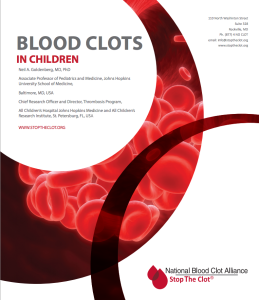What should parents look for when their children take medications for blood clots?
When a child takes anti-clotting medications, it lowers the risk of new DVT/PE. However, it does not lower this risk to zero. Parents whose child was recently diagnosed with DVT/PE should look for new signs and symptoms of DVT/PE, and for signs and symptoms that of the DVT/PE getting worse. Signs and symptoms of DVT/PE are reviewed in an earlier section of this resource.
Parents whose child is on treatment with anti-clotting medications for DVT/PE also need to look for signs of bleeding. They should also make a plan with their child’s doctor about what to if their child starts bleeding while taking anti-clotting medications.
Children taking anti-clotting medications may experience some of these side-effects:
- Small cuts on the skin may ooze longer than they did before
- Nosebleeds can occur more frequently or last longer than they did before
- Bruises in areas of injury can occur more easily and grow larger than before
- Teenage girls and young women may have heavier periods than before
Parents should seek prompt medical attention for their child with DVT/PE if:
- The child has new signs or symptoms of a DVT/PE (see prior section on signs and symptoms of DVT/PE)
- The signs and symptoms of the child’s DVT/PE get worse (see prior section on signs and symptoms of DVT/PE);
- The child bleeds often, or for a long time
- The child becomes pale or tired after bleeding has occurred
- The child develops any other issues that his/her doctor has discussed with the parents as needing prompt medical attention.
Neil A. Goldenberg, MD, PhD
Professor of Pediatrics and Medicine, Johns Hopkins University School of Medicine,
Baltimore, MD, USA
Founding Director, Pediatric Thrombosis & Stroke Programs
Johns Hopkins All Children’s Hospital
St. Petersburg, FL, USA
Updated: September 2024





